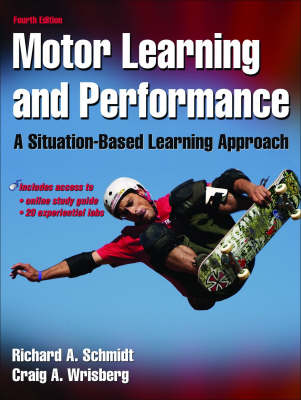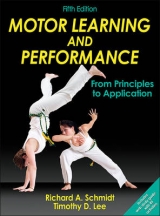
Motor Learning and Performance
Human Kinetics Publishers (Verlag)
978-0-7360-6964-9 (ISBN)
- Titel erscheint in neuer Auflage
- Artikel merken
The student-friendly fourth edition of "Motor Learning and Performance: A Situation-Based Learning Approach" expands on the fundamentals of motor performance and learning, providing valuable supporting literature and current research results in an accessible and engaging format. This text goes beyond simply presenting the latest research. Instead, Schmidt and Wrisberg challenge students not only to grasp but also to apply the fundamental concepts of motor performance and learning via a unique situation-based approach. Movement practitioners using this approach continually ask three basic questions to assist people in motor learning: who (the person learning or performing), where (the context for learning or performing), and what (the task being learned or performed). By working through situation-based exercises and case studies, students learn how to ask appropriate questions, identify solutions, and support their answers with theory or research.
"Motor Learning and Performance: A Situation-Based Learning Approach" outlines the principles of motor skill learning, develops a conceptual model of human performance, and shows students how to apply the concepts of motor learning and performance to a variety of real-world settings, including teaching, coaching, the design of performer-friendly equipment and work environments, rehabilitation, and everyday motor skill learning. Straightforward explanations of motor skill concepts and accompanying research are reinforced with both ordinary and extraordinary examples of motor skill activities, such as driving a car, playing the banjo, and mountain climbing. By applying the concepts of motor learning to familiar scenarios, the material comes alive for students, leading to better retention of information and greater interest in the application of motor performance and learning in their everyday lives and future careers. More than 76 new references, exercises, updated figures and photos, and improved chapter features make the fourth edition of "Motor Learning and Performance: A Situation-Based Learning Approach" the most user-friendly edition to date.
Each chapter is organized to include an outline listing the major topics to be presented, objectives that alert students to key content for mastery, an opening case study that previews the content within the context of a real-life example, research highlight boxes to provide more detailed descriptions of important experiments and concepts, and a running glossary for instant definitions of terms as they are introduced in the text. In addition, the authors make the text even more reader friendly with these elements such as - It Depends sections require students to identify factors that might influence motor performance and learning situations. From Principles to Practice sections simplify self-testing of key terms by reviewing and providing exercises to apply the information to real-life situations; special notes with interesting facts and quotes provide supplemental information; a summary with a compilation of important concepts wraps up each chapter and four additional in-depth case studies are featured in the final chapter. New to the fourth edition is access to an online student study guide with lab activities that bring the material to life for students.
The online study guide will help students understand and apply theories and research findings through key concepts, key terms, and review questions for each chapter and situation-based exercises to solve, each with two different student responses, an evaluation of each response, and a challenge for students to provide their own responses to the exercise on the worksheet template provided New and convenient online instructor resources are also available to course adopters of this updated text. The ancillary materials include an expanded instructor guide with chapter summary notes and additional situation-based exercises for class discussion, a presentation package of PowerPoint slides for lectures, and a test bank. "Motor Learning and Performance: A Situation-Based Learning Approach, Fourth Edition", continues to combine a conceptual model of human performance with a situation-based learning approach, making comprehension of the principles of motor performance and learning accessible even for readers with little or no knowledge of physiology, psychology, statistical methods, and other basic sciences.
In combination with the additional instructor resources and new online student study guide with lab activities, this text will help gradually shift responsibility for learning and applying the information to the student and discourage memorization and regurgitation. There is no better introduction to the fascinating field of motor learning and its many applications in the real world.
Richard A. Schmidt, PhD, heads his own consulting firm, Human Performance Research, in Marina del Rey, California, where he researches issues in human performance, human factors and ergonomics. Craig A. Wrisberg, PhD, is a professor of sport psychology at the University of Tennessee at Knoxville, where he has taught since 1977. During the past 30 years Wrisberg has published more than 90 refereed research articles and book chapters.
Chapter 1. Getting Started; Chapter 2. Processing Information and Making Decisions; Chapter 3. Sensory Contributions to Skilled Performance Preview; Chapter 4. Movement Production and Motor Programs; Chapter 5. Principles of Motor Control and Movement Accuracy Preview; Chapter 6. Individual Differences and Motor Abilities; Chapter 7. Preparing for the Learning Experience; Chapter 8. Supplementing the Learning Experience; Chapter 9. Structuring the Learning Experience; Chapter 10. Providing Feedback During the Learning Experience; Chapter 11. Facilitating Learning and Performance; Chapter 12. Applying the Principles of Skill Learning.
| Zusatzinfo | 106 black & white illustrations, 89 black & white halftones |
|---|---|
| Verlagsort | Champaign |
| Sprache | englisch |
| Maße | 216 x 279 mm |
| Themenwelt | Geisteswissenschaften ► Psychologie ► Biopsychologie / Neurowissenschaften |
| Medizin / Pharmazie ► Physiotherapie / Ergotherapie ► Rehabilitation | |
| Sozialwissenschaften ► Pädagogik ► Allgemeines / Lexika | |
| ISBN-10 | 0-7360-6964-X / 073606964X |
| ISBN-13 | 978-0-7360-6964-9 / 9780736069649 |
| Zustand | Neuware |
| Haben Sie eine Frage zum Produkt? |
aus dem Bereich



